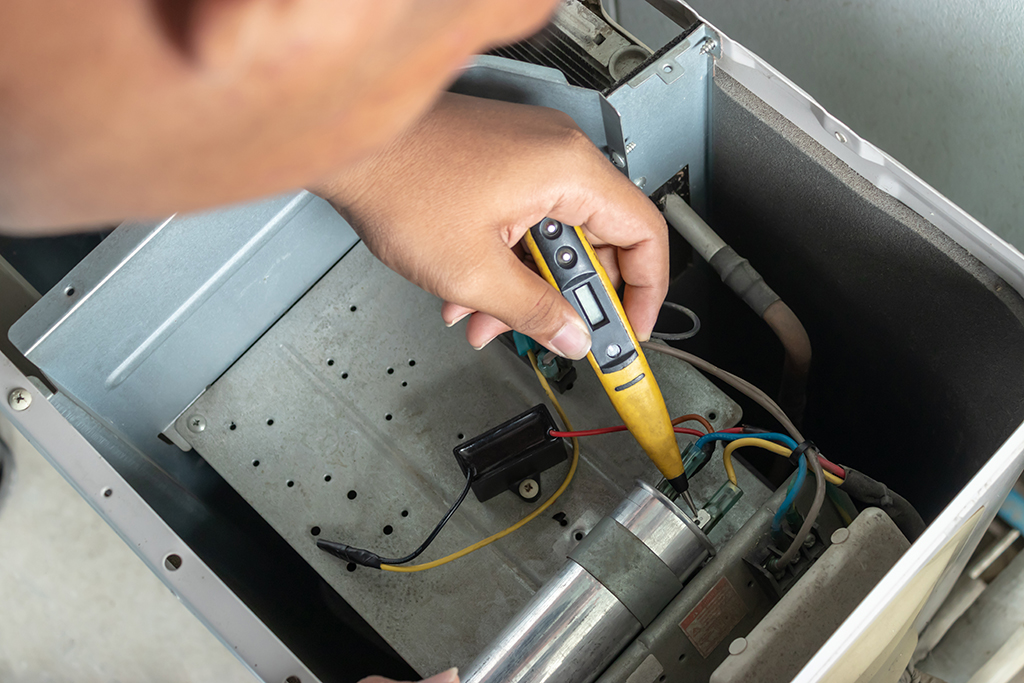Your AC unit is made up of many different parts. Knowing how everything comes together can help you diagnose what part may be defective if your AC unit is not running properly or at all. Out of all of the parts, the part that most heating and air conditioning repair companies in St. Paul, MN look at last is the capacitor, as it is usually one of the hardiest parts on an AC.
This article will look at what a capacitor does. This small part plays a huge role in the overall function of your AC and is responsible for a lot of the issues that require heating and AC repair. The good news is that it rarely fails, and even if it does fail, most AC capacitors are fairly inexpensive, so it’s an easy and quick fix.
What Is a Capacitor?
The capacitor is a small cylindrical part that is found inside the cabinet of your AC unit. To get to the capacitor, you’ll need special equipment and you’ll also need to disassemble your AC. This is why most homeowners leave any type of issues associated with the capacitor to professional heating and AC repair companies and technicians.
The capacitor is essentially like a rechargeable battery. It’s responsible for supplying the AC unit with electrical energy and for storing electrical energy that is capable of jumpstarting the AC unit. This usually requires anywhere from 400 to 600 volts. Without a functioning capacitor, your AC unit will not turn on.
The amount of capacitors that are inside an AC unit will solely depend on the type of AC unit that you have, as well as the size of the unit and your home. Our heating and AC repair technicians in St. Paul, MN will take a look at your AC unit to give you a good idea of what to expect.
Types of AC Capacitors
There are actually two different types of AC capacitors. These types of capacitors have different subtypes and they also do different jobs. Let’s get a better understanding of this important AC part by exploring the different types that are used and found in AC units.
Start Capacitors
Start capacitors are responsible for producing the electricity needed to start the motor and the fans. These capacitors only engage long enough to ensure that the AC unit is running. Once the AC unit is running, start capacitors will disengage and wait for the next time that they are needed.
You may have also heard of Super Boost Capacitors or Turbo Capacitors. These aren’t technically capacitors. Instead, they’re like jumpstart kits that you have for your car. These capacitors are able to offer an even larger boost and are usually used only in rare situations when the compressor won’t start at all or if there is an electrical problem.
Run Capacitors
Run capacitors are used more often than start capacitors. This is because these capacitors need to run the entire time that the AC unit is running. It creates a magnetic field that keeps the coil motors moving throughout the entire operation. Unlike start capacitors, there are two different types of run capacitors: single-stage run capacitors and dual-stage run capacitors.
Single-stage run capacitors will start and power only a single motor or device. They have two terminals at the top. On the other hand, dual-stage run capacitors will run more parts and will usually be found in AC units with a condensing unit. Dual-stage run capacitors have three terminals at the top
Reasons Why Capacitors Fail
As you can see, the capacitors do a fairly tough job. They also go through a lot of wear and tear, as their work will easily take a toll on them physically. Due to this reason, it’s not unusual for AC capacitors to fail before any other part does. It’s also not unusual for AC capacitors to fail more frequently or to need more heating and AC repair services in comparison to many other parts. Let’s take a look at some of the reasons why AC capacitors fail.
#1. It’s Exposed to Too Much Heat
AC capacitors are extremely sensitive to heat, which is why they are normally hidden deep inside the AC unit. Heat will cause this part to lose its ability to hold an electrical charge. This can cause the capacitor to become much less efficient. Or, in worst case scenarios, it could cause the capacitor to fail. When this happens, most heating and AC repair technicians are going to recommend that you replace the part with a new one. That’s the best course of action that you can take.
It’s important to note that high heats will not only greatly shorten the lifespan of the AC capacitor, but it can cause significant damage to your AC unit as a whole. Due to this reason, it’s always a good idea to keep your air conditioning unit in a shaded area whenever possible. It’s also why it’s important to clean your filters regularly. If you don’t, hot air can get trapped inside the AC unit.
#2. It’s the Wrong Voltage Rating
There are many different AC capacitors. When performing any type of heating and AC repair, you need to make sure that the specifications of the new capacitor matches the old one. Sometimes, inexperienced technicians or even some homeowners may try to replace the capacitors themselves. This is not only dangerous, but can also lead to a defective and faulty capacitor.
An undersized capacitor may not necessarily hurt or damage your AC unit; however, you’re expecting the capacitor to take on a much larger job than it can handle. As a result, this will shorten their life significantly, and you’ll need to perform another heating and AC repair in no time.
#3. The Capacitor Is Simply Getting Older
Like with everything in life, a capacitor has a lifespan as well. In general, you can expect most AC capacitors to last about 20 years. This is a fairly long lifespan, which is why most heating and AC repair companies will take a look at the capacitor last. They expect the capacitor to last for quite some time. With that said, some factors can cause a capacitor to wear out more quickly. For example, if the AC unit cycles more rapidly than average, the capacitor will wear out more quickly as it is doing a lot more work.
6 Signs that There’s Something Wrong with the AC Capacitor
There are so many moving parts associated with a working AC unit that it may be difficult to get a good idea of what part may be wrong. As an AC capacitor has a relatively long lifespan, it’s often the last part that most heating and AC repair technicians will look at. With that said, there are some signs that you can look for to see if the AC capacitor is a likely culprit of your woes.
#1. The AC Unit Is Not Blowing Cool Air
With summer months getting hotter and hotter, it’s no wonder that many homeowners are now turning to their AC units to get some relief from the heat. An AC unit that is not blowing cool air could have many defective parts. If the fan and the filter is not the problem, then you’ll want to check the electronic control board, the thermistor and the AC capacitor.
#2. Rising Electric Bills
This next sign of a failing AC capacitor is actually pretty unusual. Many homeowners don’t realize that an increase in the total cost of your energy bills may be attributed to a failing AC capacitor. If your AC capacitor is failing or defective, your AC unit will have to work a lot harder to get the job done. This means that it will be using a lot more energy, and this should be reflected in your energy bills. It’s important to note that an AC capacitor isn’t going to work properly for one cycle and then fail the next. It’s performance will continue to decline steadily. Due to this reason, you should see a steady rise in your electric bills.
#3. The AC Unit Turns Off on its Own
As the AC capacitor is responsible for powering the AC unit, the AC unit will turn off on its own if there’s something wrong with the capacitor. This usually means that the capacitor is no longer providing sufficient energy to the unit, as it is no longer holding enough charge to sustain the overall operation. In general, you’ll want to replace the AC capacitor as soon as possible. Most heating and AC repair companies will take a look at the amount of life that the capacitor still has.
#4. The AC Unit Doesn’t Turn on Immediately
As we mentioned before, the AC unit is responsible for jumpstarting the AC unit by giving it a huge jolt. If the AC unit doesn’t turn on immediately, this could also be a sign that you have a bad or failing AC capacitor. It means that your AC capacitor needs a lot more energy to get the job done. It may be building up enough charge in the beginning to turn the AC unit on. Once again, a heating and AC repair technician will be able to take a look at the AC capacitor to see what’s wrong.
#5. The AC Unit Won’t Turn on at All
This basically builds on top of the other reasons above. If your AC unit is not turning on at all, call a heating and AC repair technician to take a look at the unit and see whether the AC capacitor is to blame. In these situations, the AC capacitor has usually failed completely and will need to be replaced. It cannot be repaired.
#6. You Hear a Strange Humming Sound
It’s always a good idea to get used to how your AC unit sounds. If your AC unit starts to sound weird, then you should call a heating and AC repair technician immediately. If you hear a weird humming sound coming from inside the AC unit, then there’s a chance that your AC capacitor has started to fail. It is working overtime and struggling to make ends meet. That is the weird humming sound that you hear.
Testing the AC Capacitor: The Multimeter and the Capacitor
One of the main reasons why most homeowners do not test the capacitor by themselves is because they don’t have the equipment and tools needed to understand what’s going on. Most heating and AC repair technicians will rely on a multimeter. A multimeter is a tool that can determine capacitance by charging the AC capacitor with a known current. This tool will then measure the resulting voltage to calculate the capacitance.
Give Us a Call and We Can Check Out Your AC Unit Today
If your AC unit is not running properly or if you’re running into many problems, give Blue Ox Heating & Air a call. We are a heating and AC repair company that services the Minneapolis and St. Paul, MN area. Founded in 2013, the three families who founded this company have over 100 years of collective experience in handling HVAC situations. We are able to easily diagnose and inspect all types of heating and AC units and will be able to offer you various potential solutions to your problems.
Our licensed heating and AC repair technicians are not just here to quickly fix your problems and go. We want to offer you excellent services, so we’ll also take the time to answer any questions or concerns that you may have, and we’ll also walk you through the entire process. This way, you’ll know exactly what to expect and what the advantages and disadvantages of various heating and AC repair solutions may be.
We are one of the most reputable and long-standing heating and AC repair companies in the Minneapolis and St. Paul, MN area, so you can rest assured that you’re in good hands!


